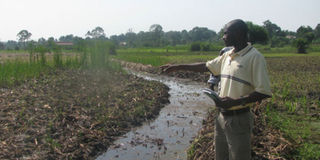Encroachers ruin Ssezibwa wetland

Kayunga District environment officer Edgar Basaliza inspects the degraded Ssezibwa wetland early this year. PHOTO BY FRED MUZAALE
Kayunga- Mr John Kasujja wades through a spacious rice garden in River Ssezibwa wetland in Kiziika Village, Nazigo Sub-county, Kayunga District.
Armed with a sickle, Kasujja cuts the ripe rice grains. In an adjacent plot of land, he has just planted new fields of rice.
The 43-year-old is among the many farmers that have encroached on the wetland for farming.
“I have been growing rice in this wetland since 2013. I was told this is a no-man’s land, which prompted me to come and start utilising it for farming,” Mr Kasujja says.
The encroachers, in hundreds, have claimed sections of the wetland, despite warnings from leaders in both Kayunga and Mukono districts to vacate.
Kayunga District Senior Environment Officer Patrick Musaazi says the most ruined sections of the wetland are in Nazigo, Ntunda, Kayunga, and Kasawo sub-counties.
The concern
According to Mr Musaazi, the encroachers, some of whom come as far as eastern Uganda, use the wetland to grow rice, vegetables, maize, yams and other crops.
The farming activities have greatly ruined some sections of the wetland, turning it into an open land, with a stream from the hitherto marshland.
Available records indicate that the wetland, which measures about 80 miles, had shrubs, reeds; woodland and natural grasslands, but the growing demand for agriculture and sand mining has left it depleted. This has resulted in silting of other small swamps which finally drain in Lake Kyoga
In 2016, Kayunga District leaders went up in arms, protesting the proposed giveaway of the wetland by the Uganda Land Commission (ULC) to an investor for sugarcane growing.
The ULC chairperson, Mr Baguma Isoke, had written to Kayunga District leaders, requesting to lease the wetland that covers four districts of Mukono, Kayunga, Nakasongola and Luweero to M/s Fakhri Enterprises Limited. The protests forced ULC to back off.
Explaining the importance of the wetland, Mr Robert Bakiika, the deputy executive director Environmental Management for Livelihood Improvement Bwaise Facility, a non- governmental organisation, Ssezibwa acts as a store and regulates flow of water.
“And when it is destroyed, cases of flooding and silting of water bodies in the area will increase. Ssezibwa wetland system has several unique flora and fauna that are gradually being lost in the process of turning it into farmland,” he says.




